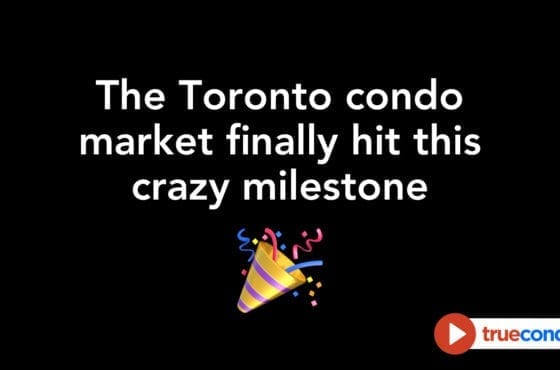Only 1/3 of millennials own

Why You Can't Afford an Apartment in Canada's Biggest Cities
As housing prices soar, a chronic shortage of rental units is creating a new market squeeze.

Prices of bachelor apartment rentals in Toronto are soaring
According to Padmapper’s real-time rental stats, bachelor apartments have climbed a whopping 15 percent since last month to reach a median price of $1,499.

As condo prices surge, young Canadians struggle to buy their first homes
Fifty-three per cent of respondents nationally said they are willing to spend up to $350,000 for their home purchase, but they may be hard-pressed to buy into the Greater Toronto Area market, where the average price of condos sold in July hit $501,750.

Pace of GTA new home sales drops while inventory continues to decline and average prices increase
Sales of new construction homes slowed down in July, while the overall supply of new homes continued its unprecedented decline and prices of available homes continued to increase, the Building Industry and Land Development Association (BILD) announced today.
TRANSCRIPT
Andrew la Fleur: Today is Monday, August the 29th and this is what is happening in the condo market this week. Thanks for checking out this video once again and the first article I want to share with you is from thewalrus.ca. The headline is Why You Can’t Afford an Apartment in Canada’s Biggest Cities, as housing prices soar a chronic shortage of units is creating a new market squeeze. So this is an interesting article talking about the rental market, rent versus buy debate, talking about the changing shifts in Canada going from more of a nation of owners to a nation of renters perhaps. And it’s all around this book that Alex Avery former CIBC Real Estate Equity Analyst has put out called The Wealthy Renter.
I haven’t read this book, but the basic principle of this book is that drawing on formulas for calculating the full costs of home ownership over a lifetime, Avery shows that if a Canadian today rents a home or apartment and prudently invests the difference between the monthly tenant expenses and the monthly average all-in carry in cost of a home or a condo, they will come out ahead.
So we’ve seen this debate many times over the years. You can make the numbers go to one side or the other depending on which side of the fence that you’re on. Obviously if I was creating a rent versus buy calculator or a book, I would talk about how buying is much better than renting for somebody who is a real estate equity analyst from former CIBC Real Estate Equity Analyst, he’s decided to take the rental side of the equation debate and work the numbers that way. You can go back and forth and debate whether it’s better to rent or to buy. But the point of the article is that as home ownership is becoming more and more expensive, more and more people are going to be looking at renting. And he’s saying that you can still be a wealthy renter if you invest your money wisely.
The problem I find with this sort of thinking and this sort of thesis is that nobody saves any more, for the most part. As real estate investors, we are a totally different breed. We are sort of the five percent of the population that looks at things very differently. But for 95 percent of the population, people aren’t saving their money. People are spending every single dollar that comes in or more than every single dollar that comes in. So this idea of you’re going to rent for, instead of buying for say 5,000 dollars a month, you’re going to rent for 3,000 dollars a month and you’re going to invest the difference at 2,000 dollars a month very prudently over 25, 30, 50 years and have this massive nest egg for retirement, I don’t know anybody who saves 2,000 dollars a month or whatever that number is for month.
People spend what they have and so even if you’re a renter, you are going to maximize the amount of rent that you can afford to get the nicest possible place that you can afford, for the most part, not everyone’s like this, but for the vast majority of people. If you’re buying, you’re going to, in most cases, max out what you can afford, what the banks will give you on a mortgage and spend all of your money to buy. So this is just how people think and this is a reality that people live with. So I’m not a big fan of the theory in general, but it’s an interesting thought nonetheless. The other thing that it really hits home on is the idea that Canada is trending more and more to a nation of renters that we’re becoming more like Europe in that sense, many of the European cities where majority of people are renting. Instead of, in Canada, the majority of people even in our big cities are owning.
So again, good news for you if you are a real estate investor that things are long term trending that way. And the more expensive that it becomes to own, the more that property prices rise, the more attractive it’s going to be for people to rent and the more demand there’s going to be on the rental side of things. Something we talk about a lot on this show, for sure. Speaking of affordability and being able to rent, the next article is from Blog TO, Prices of Bachelor Apartment Rentals in Toronto are Soaring.
So as you know, if you’ve been following me for any length of time, I’m a big proponent of studio units, bachelor units for investment. I’ve been investing in them myself personally for many years and have many studio units in my own portfolio. I’ve sold hundreds of studio units to my clients over the years. So they’re fantastic units for rental properties. They give you very good cap rates, very good ROI, always easy to rent out, especially downtown Toronto. So Pad Mapper, the website Pad Mapper which is a real estate rental website has put out their stats and they’re saying that according to their live stats for Toronto that the average bachelor apartment has risen 17 percent. This article, I think, it says 15 percent, but I went on their website and the current stats say average studio is actually 17 percent higher in price in August than it was in July. So I mean obviously it’s an interesting stat, but a key thing that I always tell all my key clients and real estate investors, just a quick teaching point educational point when you’re studying the market and looking at statistics, always remember one month does not a trend make as they say.
So if you’re just looking at how numbers move from one month to the next or one quarter to the next quarter, even in some cases one year to the previous year, you always have to be careful and look at the bigger picture. You always usually have to dig a bit deeper beneath the surface level to see what’s going on here. So when you dig a bit deeper in this case, you understand that August, every year, August is sort of peak studio month as they call it. Peak studio month, because August is when all the students are returning to the city and studios obviously are the most popular choice with students being the most affordable unit to rent and more and more students are liking to rent on their own. And a studio provides the cheapest possible option to do that in the city.
So my point is that in August, the studio rentals are always going to be very, very high compared to any other month of the year because of the student cycle that is tied to September. So keep that in mind. The article says, going back, remember the days, the price it is saying of a studio now is about 1,550 a month on Pad Mapper. The average studio price is about 1,550 a month. The article talks about how it used to be so much cheaper. I remember my first studio when I purchased it in 2010, when I bought it, I was hoping that I would get 950 a month for it and I’d be happy. I’d be breaking even. I ended up I think 1,050 a month for it when it was done, which was great. Today, now that same studio, that particular one, I sold, but if I was renting it today, it would be getting about 1,400 a month, so 950 a month in 2010 and here today, it’s worth about 1,400 a month.
So studio prices have risen very, very well over the years and they will continue to rise. They’re going to continue to be always the cheapest renting option out there. The next article is from Globe and Mail, As Condo Prices Surge, Young Canadians Struggle to Buy Their First Homes. So talking about millennials in particular, millennials being the demographic group that born in the early eighties to early 2000s. So these are baby boomers’ kids and they’re a massive cohort obviously, very important to understand millennials as real estate investors because they are our clients right now. They are a big majority of our tenants right now especially downtown Toronto. So [inaudible 00:08:13] did a survey and the key take away here is a quote here, “The pent up demand for housing from millennials is enormous, with only a third of this large demographic currently owning a property and an overwhelming majority desiring to be homeowners.” So good news for us as real estate investors. Basically, all millennials want to purchase property, but most of them, the vast majority of them have not done so yet. So there’s a massive cohort of would be home buyers moving through the system which again will create surging demand in the future for property in Canada.
So again, understanding demographics is one of the tools you want to have at your disposal, discovering demographics is one of the routines you want to get into as a condo investor and millennials being the big cohort here and most of them not owning homes, it’s good news for investors.
The last article I want to touch on is from Business Insider, Pace of GTA New Home Sales Drops While Inventory Continues to Decline and Average Prices Increase. So a whole mouthful there in the headline, a lot of things going on. Break it down a little bit. So basically, it’s saying that new home sales in July were less than July a year ago. Another thing they’re saying is that inventory, the amount of new homes available for sale continues to drop, and they’re saying that average prices are continuing to increase. So the key thing I want to touch on is the fact that they’re saying new homes are dropping.
So you might see some headlines, you might see some people talking about the fact that new homes sales in July, the numbers were less than they were a year ago. And some people might take that as a sign, again, that the market is cooling or something to that nature, which may or may not be the case. But my point with this again is one month does not a trend make as typically is stated actually in this article by Bryan Tuckey, the CEO and President of Build, the new home builder’s group. But most importently new home, when you’re looking at new home statistics track very closely with new home sales launches. So if there’s not a new launch, there’s not going to be new sales. If there’s a lot of new launches, then there’s going to be a lot of sales. There weren’t a lot of new launches in July as you can probably guess where I’m going.
There not a lot of new launches coming out in July so there were not as many sales in July. Last year, there were a lot of new launches in July. There were a lot of sales. This year, not as many. So the launches that we are tracking and seeing coming up now for September and October, a lot of demand. We are expecting a large number of launches and a large number of sales. So all that to say that the new home and especially the new condo market is not really seeing any slow down or anything to the extent that we’ve seen in the re-sale detached housing segment over the past few months.
So there you have it. Hope you enjoyed this episode and hope you found something useful. If you did, go ahead and hit the like button, hit the share button. Email this to someone you know or someone who could benefit from it and make sure you subscribe over at truecondos.com for more videos and podcasts like this. Until next time, have a great week and happy investing.



